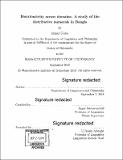Distributivity across domains : a study of the distributive numerals in Bangla
Author(s)
Guha, Ishani
DownloadFull printable version (11.06Mb)
Alternative title
Study of the distributive numerals in Bangla
Other Contributors
Massachusetts Institute of Technology. Department of Linguistics and Philosophy.
Advisor
Roger Schwarzschild.
Terms of use
Metadata
Show full item recordAbstract
In this thesis, studying the numeral indefinites in Bangla, I argue that distributive numerals are not distributivity operators themselves. The distributive numerals introduce a plurality of discourse referents, and they require that this plurality of discourse referents must enter into a formal relationship with the plurality of individuals introduced by another discourse referent. This formal requirement is known as dependency. Conventionally the phenomenon is called covariation. A distributivity operator is such that it allows this formal relationship to hold in its scope. I argue that examples involving ditransitives provide clear evidence for such an analysis. Apart from this, I discuss that the different forms of numerals have an additional restriction about encoding specificity effects. I show that the requirement of specificity and the requirement of covariation interact with each other in the scope of a distributivity operator. This interaction is encoded morphologically by differentiating between simple and complex forms of distributive numerals. The proposal is implemented by using Dynamic Plural Logic. Finally I show that the particular formalization can be extended to account for the difference between adnominal distributive numerals and adverbial (which I call 'pluractional') distributive numerals. To analyze the adnominal and adverbial distributive numerals I propose to differentiate between distributivity in the domain of individuals and distributivity in the domain of events.
Description
Thesis: Ph. D. in Linguistics, Massachusetts Institute of Technology, Department of Linguistics and Philosophy, 2018. Cataloged from PDF version of thesis. Includes bibliographical references (pages 177-180).
Date issued
2018Department
Massachusetts Institute of Technology. Department of Linguistics and PhilosophyPublisher
Massachusetts Institute of Technology
Keywords
Linguistics and Philosophy.